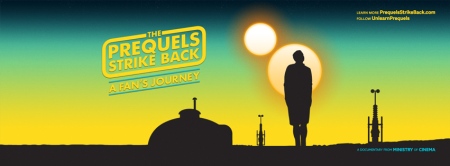Repost from matril’s Livejournal page.
It’s time for another long, impassioned post wherein I expend tremendous mental energy in order to analyze a particular aspect of the Star Wars saga. Hooray!
For those few long-time readers of my blog, you’ll know that I’ve visited this particular aspect many times before. Analyzing it, yes, but it’s also been the focus of the majority of my fan fiction, as well as quite a few of the songs in my crazy Les Starwarbles project.
The topic is, of course, Anakin and Padmé’s romance.
This is probably one of the most contentious topics among those who critique the prequels. They didn’t want to see pre-Vader as a lovesick, awkward teenager, pouring out his heart in tongue-tied stiltedness. But I love it, unabashedly.
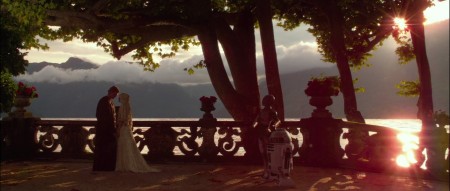
THE PRETTINESS! I AM POWERLESS BEFORE IT!
Of course being pretty is not a sufficient reason, by itself, for a romance to appeal to me. I’ll explore what I do like about this romance, but first I want to clarify what reasons I don’t include among my liking of it. That’s actually the reason I started thinking I wanted to write this post. Fictional romances come in many sizes and shapes, so to speak. There are some that I love. Then there’s some that draw little emotion from me one way or another – and finally there are some that I thoroughly despise, usually because they would be alarming, even abusive, in real life.
Here’s what has been bothering me. I’m not a fan of what I’ve started calling “that Disney space movie” (vast understatement there), and the speculation about who’s going to get kissy-faced with whom in later installments leaves me mostly saying, “Meh.” (Also, if you break up one of the best fictional couples in movie history and offer only a tepid reunion scene before killing one of them off, you are a moron. But I digress.) However, watching the – allow me to suppress a gag – Rey and Kylo Ren shippers fills me with horror and nausea. Even leaving aside the fact that they’re probably related….HE IS HER TORMENTOR. HOW IS THAT ROMANTIC? Ugh, ugh, ugh.
It shouldn’t have surprised me. There’s a certain tendency to zero in on the most appallingly dysfunctional pairing and romanticize it. To somehow believe that what amounts to Stockholm Syndrome is a dreamy scenario. This scares me, frankly. And what infuriates me even further is when said shippers assume that it’s basically the same sort of scenario as Anakin and Padmé.
WHAT. WHAT. NO. Pardon my rampaging capitals, but HEAVENS NO. This is the first and most crucial thing I want to clarify about my A/P shipping – it is never, in any way, because I’ve romanticized the “dark and angsty” dynamic of an abuser and his victim. I ship them in Episode II and the start of Episode III. Once Anakin turns to the dark side, there is nothing but the tragedy of what used to be. There is nothing romantic about Vader’s abusive behavior. It’s unacceptable. Yes, I’ve imagined many an angsty glimpse into Vader’s mind as he is tormented by memories of his wife, but even though they both loved each other to their dying breath, Padmé was right to leave him – at least, she would have done so if not for the whole being strangled and collapsing to the ground thing. Sob.
I’ve seen the monstrous lover concept idealized again and again and again, even with claims that it’s just a variation on Beauty and the Beast. Well, having written a whole discourse on that fairy tale on my other blog, I’ve made it pretty clear that I don’t equate the two at all. If the Beast is truly a monster in heart as well as outward appearance, I’m done. I don’t want anything to do with it. Blech. It implies that it’s a woman’s job to change a wicked man through the sheer strength of her love. And that is a poisonous concept. Absolutely untrue. Can someone be motivated to change themselves for the better, of their own choice and willpower? Certainly. It’s quite reasonable to see two people come together and become better people through each other’s loving influence. But you have to start out with two basically decent people, looking to unselfishly serve each other. Don’t give me that “tame the beast” garbage. That’s not what I see in Anakin and Padmé.
That brings me to something else in a similar vein. The troubling notion that Padmé is drawn to Anakin because of the darkness she sees in him – the awful cliché that the nice girl always falls for the bad boy. More nonsense, as far as I’m concerned. Proponents of this notion point out that she still confesses her love for him even after he has told her about the brutal slaughter of the Tusken Raiders. Sometimes they even suggest that she approves of his actions. Yikes. But just take a look at this.
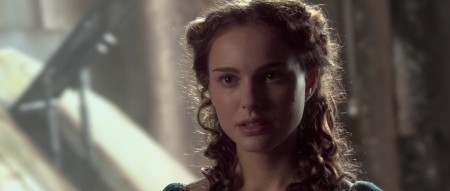
That just doesn’t look like the face of someone feeling tremendous attraction, or someone listening with savage approval. Pretty alarmed, if you ask me.
So why does she love him even when she knows he’s capable of monstrosities? Well, let’s have a study in contrasts. Here’s what Anakin looks like during his confession on Tatooine:
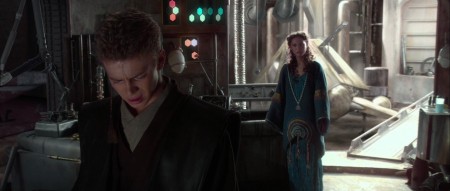
Lots of emotions here; anger, shame, horror – but he’s definite not happy. Definitely not glorying in what he’s done. Compare that with this:
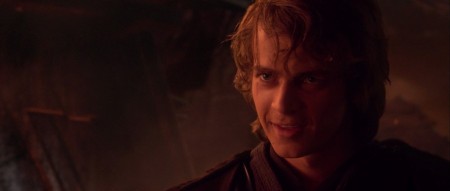
In other parts of this scene, he shows anger, jealously, resentment – but never shame. And he smiles, a chilling wild-eyed smile that shows he’s begun to glory in the Dark Side. To enjoy it. To delight in the notion of ruling the galaxy with an iron fist. Padmé sees the difference. She’s not okay with what he did on Tatooine, but she recognizes that he’s not okay with it either, and he’s fumbling blindly through grief and rage and guilt. On Mustafar, it’s not a stretch or a mere cliché for her to declare, “I don’t know you anymore!” He has truly been transformed from a man whose conscience stings at wrongdoings, to someone barely human who eschews the very notion of remorse. And she knows she cannot follow him down that path. Someone who’s attracted to bad boys might have contemplated following him. She doesn’t, not for a second.
On the other end of the spectrum, I’ve never claimed that they have a perfect, pure love that was only destroyed by external forces. I can rage at Palpatine and grump about Obi-Wan’s flawed training of Anakin, while acknowledging that Anakin carries most of the blame for his fall and the ruination of his marriage. Even if he hadn’t turned, they’d still have issues to work out. If they’d been better at communicating in Episode III, so many problems could have been avoided. I can appreciate their romance without over-idealizing it. Honestly, the same goes for the Leia/Han romance in the original trilogy – I’ve compared and contrasted the two relationships before, and explored how there’s actually more of a creep factor in Han’s courtship behaviors than in Anakin’s. I still love Leia and Han’s romance, though, particularly in how it subverts expectations in Episode VI.
But because we know Anakin’s going to become a Sith Lord, people tend to interpret all his behaviors in a much more critical light. That’s faulty reasoning. Consider it entirely from Padmé’s perspective, who remembers him as a sweet-hearted boy from when they were both children, and sees him now as an intense young man who is torn between his Jedi commitments and his personal connections; missing his mother more than he can bear, smarting at the loss of a normal childhood. At first she’s probably bemused by his obvious crush on her, then warms up to him as she spends more time in his company. In their seclusion on Naboo it’s clear that she has been starving for personal indulgences like this; conversations without any hidden political agendas, carefree strolls by the lakeside, stolen kisses. And though Anakin makes overtures, he’s never aggressively pushy, and he always backs off when she asks him to.
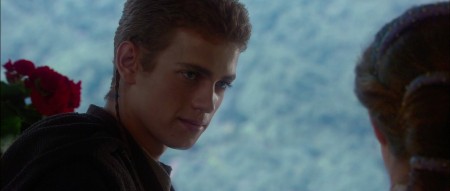
Leading up to their first kiss, offering a hesitant, nervous smile, giving her a chance to respond before venturing further.
Now consider their body language during that kiss.
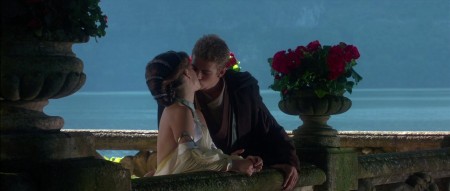
Their lips are literally the only parts touching. Anakin is so cautious, he doesn’t dare push any closer. He’s gripping the railing as if for dear life. Padmé is free to pull away, to respond however she chooses. And when she does change her mind mid-kiss, he doesn’t argue, bewildered though he might be.
I can see some problematic behaviors in the fireplace scene, when Anakin says a few things implying that Padmé carries all the blame for his turmoil and torment. Nope, it’s a two-way street, buddy. You’re not blameless here. Still, after Padmé definitively turns him down, he doesn’t make a single overture until she changes her mind. He isn’t happy about it, but he respects her wishes. And it’s only when he veers toward darker paths in the next film that their relationship truly begins to disintegrate. That distinction is important to me – the difference between a romance with two imperfect but good people, and the fallout of someone turning abusive, no longer an acceptable partner. In many ways Anakin’s behavior resembles that of an addict succumbing to full-fledged addiction. It’s possible to love an addict deeply while knowing it’s not safe to be with them anymore.
So what else do I actually like about their relationship? Oh, plenty. You might argue that it was my earliest ship, at least insofar as there was anything to ship in Episode VI. (I was two.) The idea that Vader not only used to be good, but that there was a woman he loved, the tragic unnamed figure who became Luke and Leia’s mother? Very intriguing. I recognize that I was already heavily inclined to be invested in this relationship, but it could have disappointed me. It didn’t. From the first introduction of Queen Amidala, in her insanely elaborate costumes and face-paint, I was ready to explore how this powerful, remarkable girl would fall in love with Anakin. I like how they meet and become friends as children. It’s not romantic yet – sure, Anakin has a boyish infatuation with her, but it’s simple and innocent. And darn it, I just like the idea that she’s the older one rather than the typical older-guy scenario. It also makes sense that ten years pass till their next meeting – if they’d grown up alongside each other, she probably would have had more trouble seeing him as a grown young man and a potential romantic partner. What she has, instead, is happy memories of the boy who helped her in a time of dire need, without any need for reward; a boy who cared deeply for his mother and spoke passionately of the need to help others and right wrongs.
When I first became aware of the “forbidden love” angle in Episode II promotional material, I was a little leery. I’ve never found Romeo and Juliet and their ilk very romantic. Why should I get excited by a couple whose primary attraction to each other is nothing more than the fact that it’s illicit? It’s very typical of teenagers, but not the stuff of deeply-rooted, lasting affection. And all their tumult arises from external factors largely beyond their control. Feuding families, star-crossed destinies, blah blah blah.
Not so with Anakin and Padmé. The forces that would keep them apart are, at least partly, of their own choosing. Padmé has chosen to devote herself to a life of public service, at the expense of almost any personal indulgence. Anakin wants very much to become a Jedi. If they didn’t want these things, they could simply say, “You know what? If that’s all it takes to marry you, then I’ll go ahead and resign/leave the Order.” But it’s not that simple. They are principled, dedicated people. They care too much. Yet serving their ideals comes into direct conflict with their feelings for each other. (Perhaps even more so for Anakin, because if he left the Jedi Order, then how could he justify the price he’s paid of ten years separation from his mother?) It’s a far more appealing version of forbidden love, in my view – one that grants the players more of an active role in the conflict, and makes their angst far more poignant.
I was also delighted that Padmé’s confession of love provided a nice parallel to her daughter’s words in Episode V. Both of them realize, with their beloved on the verge of death, that there’s no more time to hesitate.
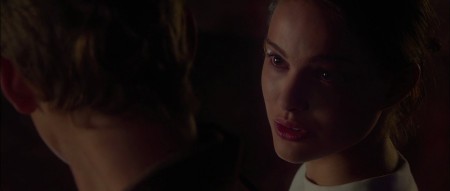
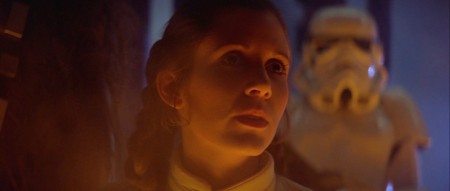
And the contrasting respective reactions from Anakin and Han are perfect for their characters – Anakin’s uncertain, “You love me?” versus Han’s self-assured and reassuring, “I know.” Much as I love the Leia/Han dynamic, I didn’t want to see an identical romance play out in the prequels. Padmé and Anakin are different characters in different situations. The parallels are nice to see, but just as important for their contrasts as for their similarities. Ignoring the nonsense of the Disney space movie, Leia will succeed where Anakin failed. There is heartbreaking tragedy, both galaxy-wide and on the smaller, intimate scale of the Skywalker family, but hope will return; the children will learn from the mistakes of their parents and build a better world.
When Episode III rolled around, I wasn’t sure what I was hoping for. I knew it would be a painful ride no matter what. But how it played out – wow. Somehow it never occurred to me that Anakin would be plagued by visions of Padmé’s death that mirrored his visions of his mother in the previous film. Now the foreshadowing seems pretty obvious, and so deliciously painful. Self-fulfilling prophesies, selling his soul for naught….a tragedy that forever changed how I view Vader. I always knew there was more to him than uncomplicated evil, but now every time I see him, I imagine the twisted bitterness of a man who threw away everything to save his wife…only to lose her through his own horribly misdirected rage. And surely to see her face, to hear her voice when Luke looks at him in Episode VI and says, “Come with me.”
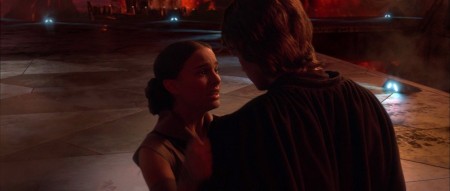
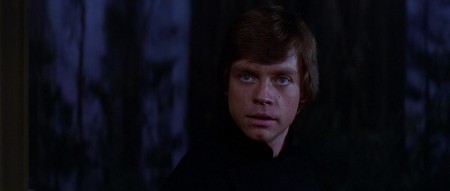
Everything about Padmé and Anakin makes the original trilogy more meaningful to me. I recognize that this opinion is not going to be shared by others, not even many fans of the prequels, because they just find their dialogue cringe-worthy or the acting wooden, or they don’t trust anything Anakin says or does because of what he will ultimately become, or they think it’s weird that they met when he was nine, or any number of other criticisms. They’re entitled to that opinion. And I’m entitled to mine. Just as long as you understand that it’s not a stereotypical nice girl/bad boy ship. It’s a complicated, angst-ridden, principle versus passion, moments-of-bliss-amid-galactic-tragedy kind of ship. The kind of ship that inspires this glorious music.
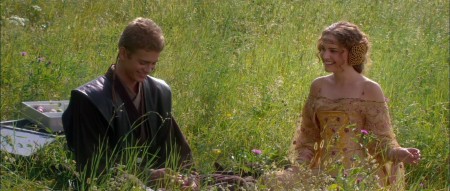
AND DARN IT ALL, IT’S PRETTY.











